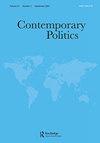Re-democratising Nepal: transitional justice and the erosion of judicial independence
IF 2
3区 社会学
Q1 POLITICAL SCIENCE
引用次数: 2
Abstract
ABSTRACT For more than a decade, Nepal has been undergoing a process of re-democratisation, its third transition to democracy since the 1950s. Among the key pillars of the new democratic regime has been the establishment of constitutionally guaranteed judicial independence. Focusing on the role of the Supreme Court in defining, overseeing, and adjudicating Nepal's transitional justice process, this article considers the extent to which judicial independence and empowerment have been achieved in Nepal's ongoing democratic transition. It argues that despite institutional measures designed to protect judicial independence and efforts by members of the Supreme Court to exercise independence in their judgments, Nepal's re-democratisation process has seen the erosion of judicial independence. In doing so, the article provides new insights into the relationship between institutional judicial independence and judicial empowerment during transitions to democracy, and highlights a significant area of concern for the achievement of democratic consolidation in Nepal.尼泊尔的再民主化:过渡司法和司法独立的侵蚀
摘要十多年来,尼泊尔一直在经历一个重新民主化的过程,这是自20世纪50年代以来第三次向民主过渡。新民主政权的关键支柱之一是建立宪法保障的司法独立。本文着眼于最高法院在定义、监督和裁决尼泊尔过渡时期司法程序方面的作用,考虑了在尼泊尔正在进行的民主过渡中实现司法独立和赋权的程度。它认为,尽管采取了旨在保护司法独立的制度措施,最高法院成员也努力在判决中行使独立性,但尼泊尔的重新民主化进程却削弱了司法独立性。在这样做的过程中,文章对向民主过渡期间机构司法独立和司法赋权之间的关系提供了新的见解,并强调了尼泊尔实现民主巩固所关注的一个重要领域。
本文章由计算机程序翻译,如有差异,请以英文原文为准。
求助全文
约1分钟内获得全文
求助全文

 求助内容:
求助内容: 应助结果提醒方式:
应助结果提醒方式:


